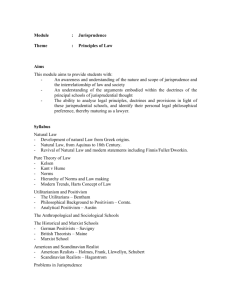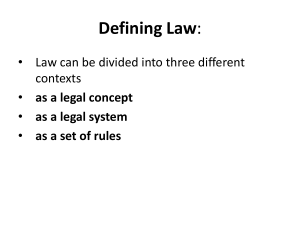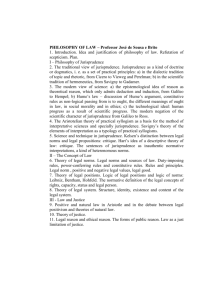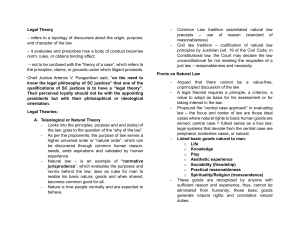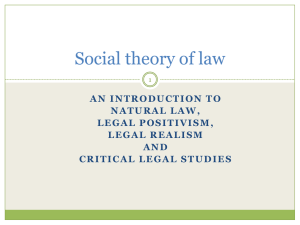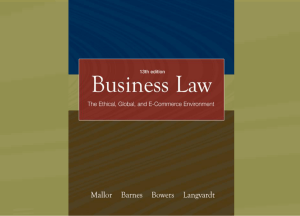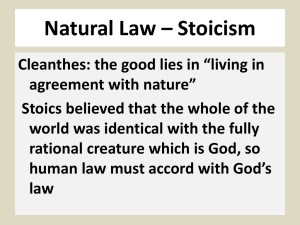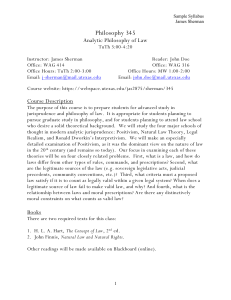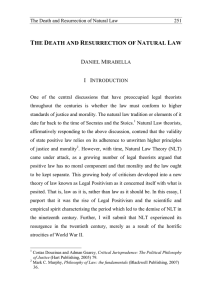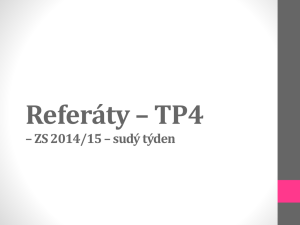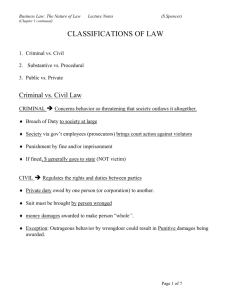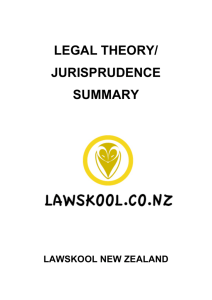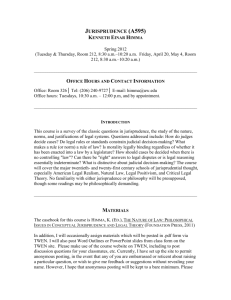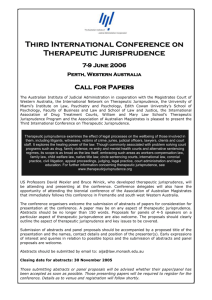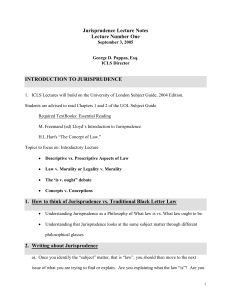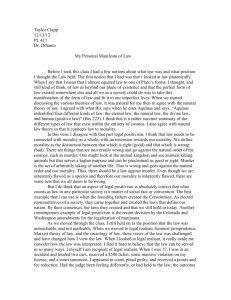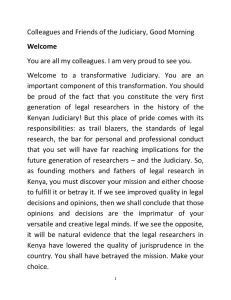Lau, Chapter 1
advertisement
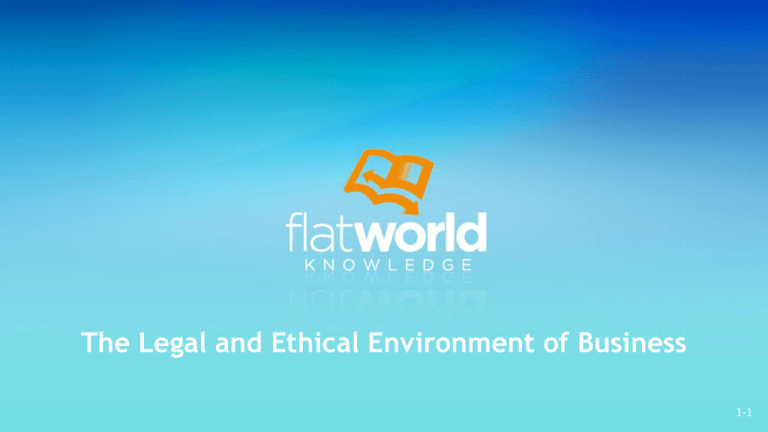
The Legal and Ethical Environment of Business 1-1 Chapter 1 Introduction to Law 1-2 Learning Objectives • Understand the meaning of jurisprudence and how its study can lead to greater understanding of our laws and legal system • Distinguish among law as power, legal positivism, legal realism, and natural law • Examine strengths and criticisms of several theories of jurisprudence • Explore examples of several theories of jurisprudence 1-3 Learning Objectives • Differentiate between social customs and law • Become familiar with primary sources of law in the United States • Understand the difference between public law and private law • Understand the relationship between state and federal systems of government 1-4 Learning Objectives • Understand what a rule of law system is • Explore the U.S. rule of law system • Determine why the rule of law is important to business • Identify several areas of law that are especially relevant to business and the importance of the rule of law to those areas 1-5 Learning Objectives • Identify how the rule of law limits government • Identify how the rule of law protects people from harmful business practices • Identify the relevance of law to business disciplines • Understand the relevance of law to the study of business • Identify how the rule of law protects people from harmful business practices 1-6 What is Law? • Law is a set of rules that are enforced by a government authority • Jurisprudence: The philosophy of law 1-7 Different Theories of Jurisprudence • Law is simply power • Legal positivism: A belief that the law is whatever the sovereign says it is – The law is written, human-made rules • Common criticism of legal positivism – Prohibits individuals from remaining true to their own consciences when their consciences conflict with the laws of the sovereign 1-8 Different Theories of Jurisprudence • Legal realism: A belief that the law itself is less important than who is in the position to enforce it – Critics of legal realism argue that judges should not use any factors other than the written law when rendering decisions • Natural law: A belief that humans possess certain inalienable rights that are not the products of human-made law 1-9 Social Customs and Law • One type of “right from wrong” is based on societal norms and cultural expectations • The other type of “right from wrong” is based on a source recognized as a holding legitimate authority to enforce law within our society • These are two types of rules in our society—social norms and laws • Law can generally be classified as public law or private law Types of Law • Public law: Applies to everyone • Private law: Legally binding on parties who agree to it, such as a contract • Procedural law: The legal rules that must be followed by government officials in the execution of law • Substantive law: The actual substance of the law or the merits of the claim, case, or action 1-11 Sources of Law • Primary sources of law: Actual laws – Include constitutions, statutes, and judicial opinions • Secondary sources of law: Interpretations of law – Include restatements of law, journal articles, and treatises – Treatise: An exposition or summary of an area or body of law 1-12 Sources of Law • Uniform Commercial Code (UCC): A model statute that seeks to provide uniformity to contracts law among the different states – It is not a law until state legislatures adopt it as law • U.S. Constitution: The supreme law of the land – It created the structure of the U.S. federal government • Bill of Rights: The first ten amendments to the U.S. Constitution 1-13 Sources of Law • Federalism: A system in which power is divided between two or more forms of government • Statutory law: Law created by legislative bodies • Bicameral: A legislature in which two bodies exist – U.S. Congress is composed of the Senate and the House of Representatives 1-14 Sources of Law • Common law: Judge-made law • Civil law: A system of law in which only the legislature creates law • Jurisdiction: An area where power may be exercised 1-15 Sources of Law • Stare decisis: “Let what has already been decided stand” – It is the principle that courts should follow precedents – Precedent: Existing interpretation of law, based on prior decisions • Police power: The general power of states to regulate for the health, safety, and general welfare of the public • Vice laws: Laws targeted at regulating or prohibiting vice activities or businesses engaged in vice activities – Gambling, prostitution, alcohol consumption, and pornography 1-16 Sources of Law • Rules or regulations: Created by administrative agencies and have the force of law • Enabling legislation: Statutes created by Congress to create individual administrative agencies 1-17 The Rule of Law • A system of laws under which the people and the government are bound • It establishes authority, creates expectations for behavior, and establishes redress for grievances and penalties for deviance – English Bill of Rights of 1689: Contains the basis for many concepts contained in the U.S. Constitution, including the rights of the people to limit the sovereign 1-18 The Rule of Law • According to many rule of law systems, the attainment of peace relies on the establishment of a hierarchical authority structure – Code of Hammurabi: The oldest record that we have of a seemingly complete rule of law system – Magna Carta of 1215: Contains the basis for many legal principles recognized in the U.S. Constitution, including due process and habeas corpus 1-19 The Rule of Law • The difference between power and authority – Power is the ability to make someone behave in a predictable manner – Authority draws its strength from legitimacy 1-20 The Rule of Law • Organizational structures for government are set out in rule of law systems • U.S. Constitution: The supreme law of the land – It created the structure of the U.S. federal government 1-21 Importance of Rule of Law to Business • Without the rule of law, business would be chaotic • The rule of law: – Establishes rules that people and businesses must follow to avoid being penalized – Provides a peaceful and predictable means by which disputes can be resolved – Provides guidance and direction in every area of business – Provides a sophisticated system of federalism (in the United States) 1-22 Importance of Rule of Law to Business – Governs contracts between people and between merchants – Provides protection for property – Protects people from businesses – Protects businesses from government 1-23 Importance of Rule of Law to Business • Due to the existence of a rule of law system: – Employers know the rules of the game regarding their relationship to employees – Employees know the rules with respect to their obligations to employers – Businesses can rely on it to govern their debtor and creditor relationships How Law Affects Business Disciplines • A solid understanding of the legal environment can help avoid liability or at least minimize risk • As a result of the fallout from the Enron case, Congress passed the Sarbanes-Oxley Act (SOX) of 2002 – Imposed stringent oversight requirements on accounting and auditing firms • SOX seeks to ensure: – Competence – Compliance with security laws – Conduct consistent with generally accepted accounting principles 1-25 How Law Affects Business Disciplines • U.S. Securities and Exchange Commission’s (SEC) mission – Protects investors and to maintain a fair market – Enforces accounting and auditing policies – Pursues charges of accounting fraud – Oversees private regulation of the accounting profession – Enforces prohibitions against insider trading and other types of securities fraud, such as Ponzi schemes • Ponzi scheme: A type of investment fraud similar to a pyramid scheme 1-26 How Law Affects Business Disciplines • In financial transactions – Truth in Lending Act (TILA): A federal statute that requires lenders to provide accurate information concerning costs involved in offers of credit – Regulation Z: The regulation that implements the Truth in Lending Act • In management – Title VII of the Civil Rights Act: The act that prohibits discrimination related to protected characteristics in hiring and employment practices 1-27 How Law Affects Business Disciplines • In marketing – Marketers must be particularly attuned to tort law, consumer protection law, and intellectual property law – Federal Trade Commission (FTC): A federal agency that protects consumers 1-28
